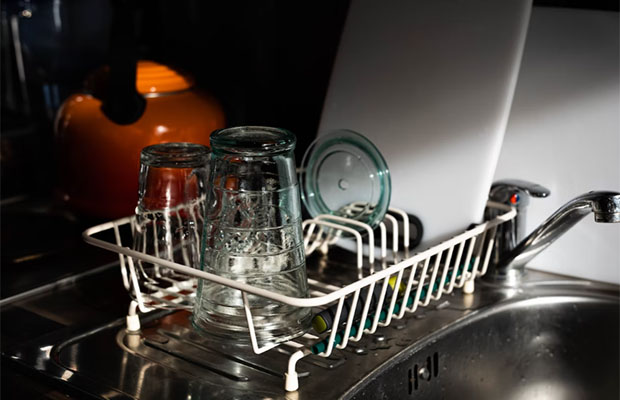Because washing the dishes takes time, many people choose to use dishwashers. It takes a lot less time to load and unload than to wash the dishes by hand. It will take much longer to complete the cycles than it would wash by hand. How long does a dishwasher take? The duration of the dishwasher cycle should be between 1.5 and 4 hours.
Concerning how long a dishwasher should take to wash, we’ll address all of your pressing inquiries. Following that, you can decide if it’s appropriate for you.
Continue reading, to learn more about dishwasher running time.
Related Reading: Can baby bottles go in the dishwasher?
Table of Contents
Washing Dishes Vs. Using The Dishwasher
We believe that running a dishwasher is much simpler, more cost-effective, and more efficient.
Even though there is the initial cost of the dishwasher itself, which can be expensive or fairly affordable, you will ultimately save money. However, because dishwasher cycles are lengthy, if you can complete your daily dishes in less than 10 minutes, a dishwasher might not be for you.
How Long Does A Dishwasher Take To Wash?
Cycle times on older dishwashers were shorter. Modern dishwashers are more water and energy efficient than older models. Even though it runs for a longer period of time, it works with less electricity.
The typical dishwasher cycle lasts 2.5 hours. This is based on a typical cycle with a more recent machine. The majority, if not all, modern dishwashers are equipped with sensors that determine how many rinse cycles should be run based on how dirty the wash water is. When a sensor is dirty, it may occasionally give the machine the incorrect instruction to continue running rinse cycles. The dishwasher’s cycles are described here, along with an estimated run time.

How Long Should Dishwasher Take To Wash The Dishes?
The cycle you select, the type of dishwasher you have, and the brand you choose will all affect this.
Dishwashers that are portable and countertop will typically operate more quickly than built-in models. Intensive or heavy cycles will last a little longer than regular or eco cycles. However, you should budget between 1.5 and 4 hours for the dishwasher cycle.
To find out how long each cycle should last, consult your manufacturer’s instructions. It might also display the remaining time on the LED screen if your dishwasher has a front panel.
Why Do Dishwashers Take A Long Time To Finish?
You need to run several tests to determine if you are correct if you believe that your dishwasher is taking a long time to complete a cycle.
Run a typical cycle several times and note the duration of each cycle to accomplish this. Compare your times to those in the user manual by consulting your device.
You might discover that there is little to no difference between the eras. A significant difference, however, might exist.
(No sign of your manual? Visit the manufacturer’s website and download a copy there).
Your dishwasher may seem to be taking a long time to complete for a variety of reasons. I’ll go over these arguments below.
Reason 1: First Time Using A New Dishwasher
There’s no need to be concerned if your new companion has just completed its first cycle and you initially thought it took a while.
It can sometimes take new dishwashers a few cycles to calibrate and “bed in” after being completely idle.
It’s completely normal for a cycle to take longer than it should, and you shouldn’t try to stop this cycle because the machine is still learning at this point.
If excessively long cycles continue, you should take into account the following factors.
Reason 2: Wrong Cycle Selected
On our appliances, we occasionally select the incorrect settings in a hurry. So, if the dishwasher is taking longer to finish, double-check that you selected the right cycle in the first place.
Although it happens frequently with both old and new models, it can be prevented in the future by double-checking the cycle that has been selected.
Reason 3: “Auto” Or “Sensor Wash”
You may have seen a button that says “Auto” or “Sensor wash” at the top of your ultra-modern dishwasher. Great things begin to happen when you press this button!
Basically, if you press your dishwasher’s “Auto” or “Sensor wash” button, it will automatically assess how dirty your dishes are and then select the best wash cycle for you.
This means that the dishwasher determines the length of a cycle, the amount of water required, and the temperature of the water in order to thoroughly clean your dishes. A lot of time, money, and stress are saved by this very ingenious setting.
In other words, sometimes people will press this setting without fully understanding what it does. As a result, they come to believe that their dishwasher is taking an exceptionally long time to complete.
When in fact a longer cycle is just what the dishwasher is doing because it thinks the dishes need to be cleaned for a longer period of time. The dishwasher is merely performing its intended function; there isn’t really a problem with it.
Think about it: if you put a bunch of greasy pots and pans in the dishwasher, the “Auto” or “Sensor wash” detects the grease and begins the best wash possible to get the pots clean. The cycle will be completed over time.
On the other hand, if you use the “Auto” or “Sensor wash” to remove general dirt from plates, you might find that the dishwasher cycle is finished much sooner than you anticipated.
I should note that this “Auto” or “Sensor wash” setting is relatively new, so if your dishwasher is older, it probably doesn’t have it.
Reason 4: Modern Dishwasher
The fact that your dishwasher is modern could be the reason why it takes longer to complete than you anticipate. Despite the absurdity of this, bear with me while I explain.
Several things have changed since you purchased your previous kitchen appliance, which may surprise you if you’re new to the modern dishwasher scene.
In a nutshell, a lot of people want to save water when using a dishwasher because we live in a time that is largely dominated by technology.
Energy-efficient dishwashers were made possible by dishwasher manufacturers who listened to customers and modified their products to fit this new time and way of thinking.
These contemporary dishwashers are equipped with cutting-edge technology and consume little water. Modern dishwashers take longer to complete a cycle because of these new features, though.
Despite what might seem to be the contrary, modern dishwashers are actually very efficient; all that is required of them is a slight delay in operation. And this may be the reason why your cycles are longer than usual.
Reason 5: Dirt And Limescale Build-up
If you don’t properly clean your dishwasher, dirt and limescale will begin to accumulate inside the appliance.
The cleaning sensor can occasionally become dirty, which causes the machine to run a longer cycle because it believes there is still dirt on the dishes. However, in actuality the dishes are clean and the sensor is filthy.
It would be sufficient to give the dishwasher a quick clean.
Reason 6: Water Isn’t Warm Enough
A dishwasher’s water must be hot enough to completely remove all dirt from the dishes.
The longer cycle is necessary because the dishwasher must run longer if the water isn’t warm enough to properly clean the dishes.
Typically, a temperature of 130–140 °F (54–60 °C) is preferred.
Tips for the future:
- Ensure that the hot water supply, not the cold, is being used to connect the dishwasher.
- To speed up the flow of hot water into the dishwasher, turn on the faucet next to it.
- Verify that the dishwasher’s insulation is functioning properly. It is bad for the dishwasher if it isn’t because it will release heat.
- Make sure the heating element is operating properly by giving it a once-over. If anything breaks, it can be fixed.
If you need to fix anything mentioned in the bullet points above, you may need to hire a professional, but you can also try solving the issue on your own.
Reason 7: Water Pressure Is Insufficient
In order for your dishwasher to operate, there must be enough water pressure. It must wait for momentum to build up if there is insufficient water pressure entering the appliance in the first place. The cycle will then take longer to complete.
A water pressure supply of 20 to 120 psi is required.
Reason 8: Dishwasher Is Clogged Up
Dishwashers will clog up if they aren’t kept up with and cleaned. Everything from food scraps to grease to hair can clog a dishwasher.
As a result, water cannot properly enter and exit the dishwasher. Due to this, the water enters and exits the machine more slowly, lengthening the cycle.
If you’re unsure of where to look for a clog, try these places:
- Drain hose
- Filters
Even if you have a self-cleaning dishwasher, it’s still important to clean these areas because clogs there can accumulate and lead to even worse issues in the future.
For more assistance, see our article on clearing a dishwasher blockage.
When Should You Contact Professional Assistance?
The majority of the issues I’ve mentioned above can typically be resolved by the dishwasher user.
For instance, you can choose the appropriate cycles, check to see how dirty your dishes are before a cycle starts, and unblock a dishwasher on your own.
To get assistance, you might need to call someone in if a dishwasher component needs to be fixed or if you need plumbing advice.
If you do hire someone to fix your dishwasher or another plumbing-related issue, you should do your homework and research different companies before they arrive.
In this manner, you should be able to receive prompt and suitable assistance and you won’t have to deal with time wasters.
Which Dishwasher Has The Quickest Cycle Time?
You’re in luck if you’re looking for a dishwasher with a lightning-fast cycle. The quickest dishwashers can finish in just 15 minutes, but they are very expensive.
- Miele PG 8061: Depending on the power situation, the amount of water put in, and the water temperature, this dishwasher has a 15-minute cycle.
- Thermador DWHD870WFP: There is a 20-minute Star Speed cycle on this dishwasher.
- Asko D5436XLS: This is only advised for lightly soiled dishes and has a 20-minute cycle.
- Bosch SHXN8U55UC: There is an express cycle on this dishwasher that finishes in 30 minutes or less.
- Electrolux EI24ID50QS: A 30-minute cycle is offered by this dishwasher.
We advise taking a look at these models if you’re looking for something that can perform quick washes and you have the money for it.
Dishwasher’s Lifespan
A dishwasher lasts for ten years. This is based on 215 uses on average per year or roughly 4 times per week. Typically, the part that requires maintenance, repair, or replacement is the motor or the pump. This repair could cost up to $800 in labor and parts, which is about what a new machine would cost.
The dishwasher may only operate for six years under heavy use. While some other dishwashers need to be replaced after 15 or 16 years, others can last longer.
FAQs
How Many Times A Week Should You Run The Dishwasher?
Depending on how many dishes you have, yes! The majority of people run their dishwasher once per day, typically in the evening, to prepare the dishes for the following day.
To prevent dirty plates from amassing for a while, we advise running the dishwasher at least once every couple of days. This produces unpleasant odors, and as the food dries, it becomes more difficult for the dishwasher to clean it.
Can I Use The Dishwasher At Night?
Check with your manufacturer because there is some debate surrounding this. Some say not to, as it poses a fire risk.
Just after dinner, in the evenings, is the best time to run the dishwasher. You’ll have finished eating for the day’s most part, and energy costs will be lower. Furthermore, you ought to finish it before going to bed so that you can be present if something goes wrong.
Can You Halt A Dishwasher That Is Running?
Yes, you can either choose the pause button or the cancel cycle button. Open the door if necessary if your dishwasher lacks these or is a top-panel model. The cycle will end, but the dishes might still be wet and covered in detergent.
Final Thoughts
The majority of modern machines have an automatic setting that senses how dirty the dishes are and modifies the cycle’s heat, length, and water pressure accordingly.
The typical cycle time for a dishwasher is a few hours. However, because of the strong water jets, detergent, and high heat, they wash dishes much more effectively than we could ever do by hand!
We strongly advise getting a dishwasher if you don’t mind waiting around for your dishes to wash and dry.


